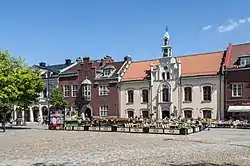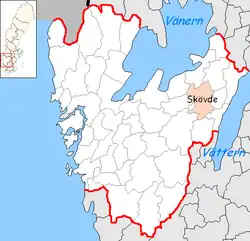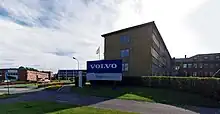Skövde Municipality
Skövde Municipality (Skövde kommun) is a municipality in Västra Götaland County in western Sweden. Its seat is located in the city of Skövde.
Skövde Municipality
Skövde kommun | |
|---|---|
 Skövde town hall | |
 Coat of arms | |
 | |
| Coordinates: 58°23′N 13°51′E | |
| Country | Sweden |
| County | Västra Götaland County |
| Seat | Skövde |
| Area | |
| • Total | 685.08 km2 (264.51 sq mi) |
| • Land | 673.68 km2 (260.11 sq mi) |
| • Water | 11.4 km2 (4.4 sq mi) |
| Area as of 1 January 2014. | |
| Population (31 December 2021)[2] | |
| • Total | 57,016 |
| • Density | 83/km2 (220/sq mi) |
| Time zone | UTC+1 (CET) |
| • Summer (DST) | UTC+2 (CEST) |
| ISO 3166 code | SE |
| Province | Västergötland |
| Municipal code | 1496 |
| Website | www.skovde.se |
The present municipality was formed in 1971 when the City of Skövde was amalgamated with five surrounding municipalities. The number of original entities (as of 1863) is nearly 30. They had in 1952 been reduced to six.
Economy

The single largest employer in the municipality is Volvo, with Volvo Powertrain and Volvo Cars together employing approximately 5,000 people.
Other major employers are the hospital (Skaraborg Hospital, serving the Västra Götaland region), the local regiments (among Sweden's largest) and the municipality itself.
Education
University of Skövde is the largest university in the town. It is ranked 21 in the nation's ranking. Informatics and computer science along with Bio-informatics and molecular biology are some of the chief international students picks.
Elections
Riksdag
These are the local results of the Riksdag elections since the 1972 municipality reform. The results of the Sweden Democrats were not published by SCB between 1988 and 1998 at a municipal level to the party's small nationwide size at the time. "Votes" denotes valid votes, whereas "Turnout" denotes also blank and invalid votes.
| Year | Turnout | Votes | V | S | MP | C | L | KD | M | SD | ND |
|---|---|---|---|---|---|---|---|---|---|---|---|
| 1973[3] | 90.6 | 26,522 | 3.5 | 38.0 | 0.0 | 30.4 | 11.1 | 2.5 | 14.1 | 0.0 | 0.0 |
| 1976[4] | 91.1 | 28,509 | 3.2 | 37.3 | 0.0 | 30.2 | 12.5 | 2.0 | 14.4 | 0.0 | 0.0 |
| 1979[5] | 89.5 | 26,825 | 4.4 | 39.0 | 0.0 | 21.7 | 11.7 | 2.0 | 20.1 | 0.0 | 0.0 |
| 1982[6] | 91.0 | 29,704 | 4.4 | 42.3 | 1.3 | 19.1 | 6.4 | 2.5 | 23.8 | 0.0 | 0.0 |
| 1985[7] | 89.7 | 30,232 | 4.1 | 43.2 | 1.4 | 15.0 | 15.8 | 0.0 | 20.4 | 0.0 | 0.0 |
| 1988[8] | 86.2 | 29,447 | 4.7 | 43.2 | 5.0 | 13.2 | 13.0 | 3.7 | 17.1 | 0.0 | 0.0 |
| 1991[9] | 86.8 | 30,035 | 3.2 | 36.5 | 2.8 | 9.9 | 9.2 | 9.2 | 20.5 | 0.0 | 7.7 |
| 1994[10] | 87.3 | 31,015 | 5.3 | 44.3 | 4.9 | 9.6 | 7.1 | 4.7 | 22.0 | 0.0 | 1.3 |
| 1998[11] | 81.7 | 29,456 | 10.5 | 36.5 | 3.9 | 6.3 | 4.3 | 15.0 | 21.9 | 0.0 | 0.0 |
| 2002[12] | 80.6 | 29,477 | 7.0 | 40.9 | 3.9 | 7.5 | 12.2 | 11.6 | 14.5 | 1.0 | 0.0 |
| 2006[13] | 82.3 | 31,006 | 5.0 | 37.5 | 4.0 | 8.8 | 6.7 | 7.4 | 25.4 | 3.0 | 0.0 |
| 2010[14] | 85.3 | 33,360 | 4.7 | 31.0 | 6.3 | 7.5 | 7.3 | 6.3 | 30.3 | 5.3 | 0.0 |
| 2014[15] | 87.1 | 35,405 | 4.0 | 32.8 | 5.7 | 7.4 | 5.5 | 5.0 | 23.7 | 12.7 | 0.0 |
Blocs
This lists the relative strength of the socialist and centre-right blocs since 1973, but parties not elected to the Riksdag are inserted as "other", including the Sweden Democrats results from 1988 to 2006, but also the Christian Democrats pre-1991 and the Greens in 1982, 1985 and 1991. The sources are identical to the table above. The coalition or government mandate marked in bold formed the government after the election. New Democracy got elected in 1991 but are still listed as "other" due to the short lifespan of the party. "Elected" is the total number of percentage points from the municipality that went to parties who were elected to the Riksdag.
| Year | Turnout | Votes | Left | Right | SD | Other | Elected |
|---|---|---|---|---|---|---|---|
| 1973 | 90.6 | 26,522 | 41.5 | 55.6 | 0.0 | 2.9 | 97.1 |
| 1976 | 91.1 | 28,509 | 40.5 | 57.1 | 0.0 | 2.4 | 97.6 |
| 1979 | 89.5 | 26,825 | 43.4 | 53.5 | 0.0 | 3.1 | 96.9 |
| 1982 | 91.0 | 29,704 | 46.7 | 49.3 | 0.0 | 4.0 | 96.0 |
| 1985 | 89.7 | 30,232 | 47.3 | 51.2 | 0.0 | 1.1 | 98.9 |
| 1988 | 86.2 | 29,447 | 52.9 | 43.3 | 0.0 | 3.8 | 96.2 |
| 1991 | 86.8 | 30,035 | 39.7 | 48.8 | 0.0 | 11.5 | 96.2 |
| 1994 | 87.3 | 31,015 | 54.5 | 43.4 | 0.0 | 2.1 | 97.9 |
| 1998 | 81.7 | 29,456 | 50.9 | 47.5 | 0.0 | 1.6 | 98.4 |
| 2002 | 80.6 | 29,477 | 51.8 | 45.8 | 0.0 | 2.4 | 97.6 |
| 2006 | 82.3 | 31,006 | 46.5 | 48.3 | 0.0 | 5.2 | 94.8 |
| 2010 | 85.3 | 33,360 | 41.7 | 51.4 | 5.3 | 1.6 | 98.4 |
| 2014 | 87.1 | 35,405 | 42.5 | 41.6 | 12.7 | 3.2 | 96.8 |
Twin cities
 Halden, Norway, since the 1940s
Halden, Norway, since the 1940s Ringsted Municipality, Denmark, since the 1940s
Ringsted Municipality, Denmark, since the 1940s Sastamala, Finland, since the 1940s
Sastamala, Finland, since the 1940s Kuressaare, Estonia, since 1994
Kuressaare, Estonia, since 1994 Zhangjiakou,China,since 2015[16]
Zhangjiakou,China,since 2015[16]
References
- "Statistiska centralbyrån, Kommunarealer den 1 januari 2014" (in Swedish). Statistics Sweden. 2014-01-01. Archived from the original (Microsoft Excel) on 2016-09-27. Retrieved 2014-04-18.
- "Folkmängd i riket, län och kommuner 31 december 2021" (in Swedish). Statistics Sweden. February 22, 2022. Retrieved February 22, 2022.
- "Riksdagsvalet 1973 (page 166)" (PDF) (in Swedish). SCB. Retrieved 23 August 2017.
- "Riksdagsvalet 1976 (page 161)" (PDF) (in Swedish). SCB. Retrieved 23 August 2017.
- "Riksdagsvalet 1979 (page 185)" (PDF) (in Swedish). SCB. Retrieved 23 August 2017.
- "Riksdagsvalet 1982 (page 186)" (PDF) (in Swedish). SCB. Retrieved 23 August 2017.
- "Riksdagsvalet 1985 (page 187)" (PDF) (in Swedish). SCB. Retrieved 23 August 2017.
- "Riksdagsvalet 1988 (page 167)" (PDF) (in Swedish). SCB. Retrieved 23 August 2017.
- "Riksdagsvalet 1991 (page 29)" (PDF) (in Swedish). SCB. Retrieved 23 August 2017.
- "Riksdagsvalet 1994 (page 43)" (PDF) (in Swedish). SCB. Retrieved 23 August 2017.
- "Riksdagsvalet 1998 (page 39)" (PDF) (in Swedish). SCB. Retrieved 22 August 2017.
- "Valresultat Riksdag Skövde kommun 2002" (in Swedish). Valmyndigheten. Retrieved 23 August 2017.
- "Valresultat Riksdag Skövde kommun 2006" (in Swedish). Valmyndigheten. Retrieved 23 August 2017.
- "Valresultat Riksdag Skövde kommun 2010" (in Swedish). Valmyndigheten. Retrieved 23 August 2017.
- "Valresultat Riksdag Skövde kommun 2014" (in Swedish). Valmyndigheten. Retrieved 23 August 2017.
- "Vänorter".
External links
- Official website
 (in Swedish)
(in Swedish)